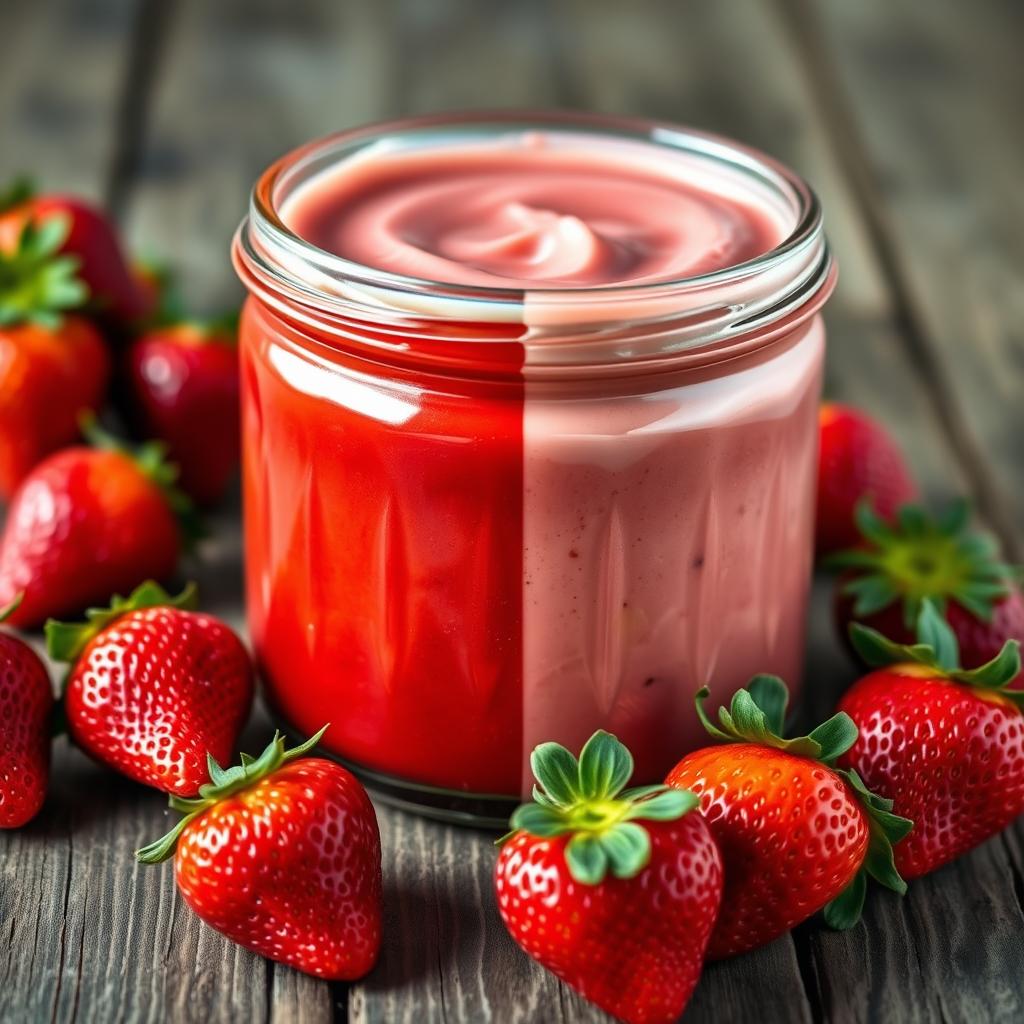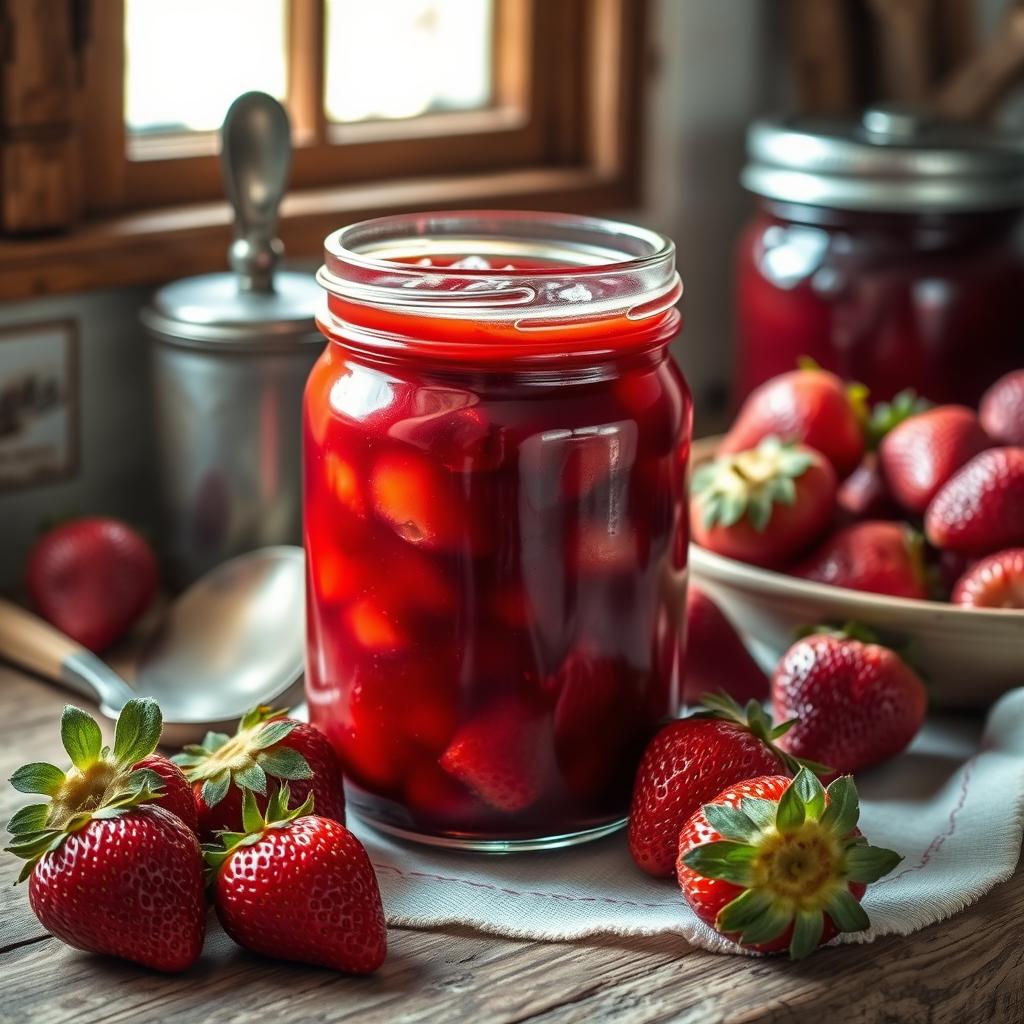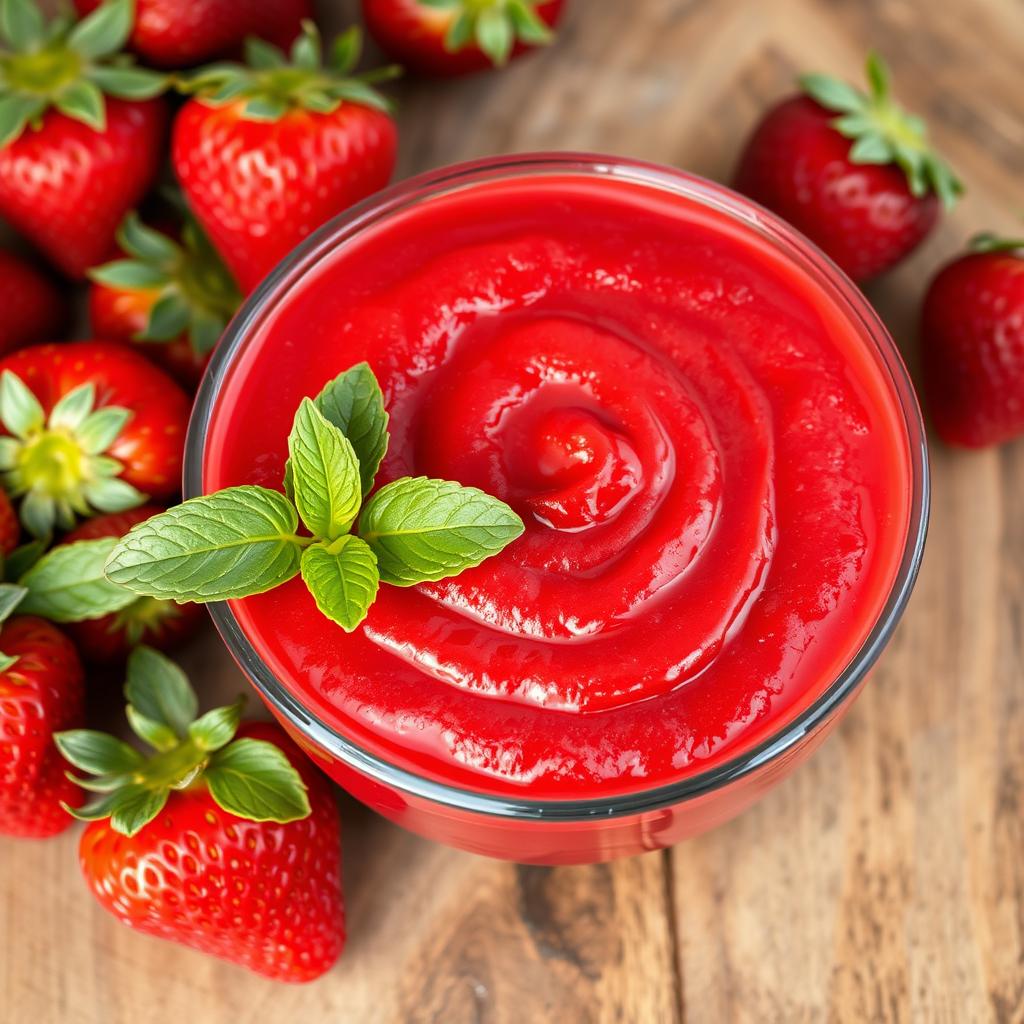I love exploring the world of food, from fresh colors to amazing smells. Today, I’m excited to answer a question that has puzzled many: is strawberry puree the same as jam?
In this guide, we’ll dive into the differences between strawberry puree and jam. Whether you’re making homemade preserves or trying new recipes, knowing the differences will help you improve your cooking. It will also open up new flavors for you to enjoy.

Key Takeaways
- Strawberry puree and jam have distinct textures and consistencies.
- The primary ingredient composition varies between the two, with puree focusing on the fruit and jam containing additional sweeteners.
- Preparation methods differ, with puree being a finer, more concentrated version of the fruit.
- Strawberry puree offers a more intense, vibrant flavor profile compared to traditional jam.
- Culinary applications for puree and jam differ, with each lending unique qualities to dishes and baked goods.
Understanding the Basic Differences Between Strawberry Puree and Jam
Fruit preserves like strawberry puree and jam can seem similar but are not. They differ in texture, ingredients, and how they’re made. Knowing these differences helps you choose the right one for your recipes.
Texture and Consistency Variations
Strawberry puree is smooth and creamy, easy to pour. It’s made by blending strawberries into a uniform paste. Jam, on the other hand, is thicker and spreadable, with bits of fruit or a gel-like texture.
Primary Ingredient Composition
Strawberry puree mainly contains strawberries. It’s made from concentrated strawberry pulp with little else added. Jam, however, mixes strawberries with sugar and sometimes pectin to thicken it.
Processing Methods Compared
Making strawberry puree involves blending the fruit with a bit of water or lemon juice. Jam, though, needs cooking strawberries with sugar and pectin until it thickens.
| Characteristic | Strawberry Puree | Strawberry Jam |
|---|---|---|
| Texture | Smooth, creamy, pourable | Thick, spreadable, with fruit pieces |
| Ingredients | Strawberries, with minimal additives | Strawberries, sugar, pectin |
| Processing | Blending or pureeing | Cooking with sugar and pectin |
Understanding these key differences helps you pick the right fruit preserve. Whether it’s strawberry puree or jam, it depends on your cooking needs and taste.

The Making of Traditional Strawberry Jam
Making the perfect strawberry conserve is an art passed down through generations. It combines fresh strawberries, sugar, and natural pectin. Together, they create the thick, spreadable texture of traditional fruit compote.
The journey starts with picking the ripest, juiciest strawberries. These are then washed, hulled, and puréed to release their sugars and flavors. The strawberry purée is mixed with the right amount of sugar for the perfect sweetness.
- Slowly simmer the strawberry purée and sugar mixture over medium heat, stirring occasionally to prevent scorching.
- As the mixture thickens, the natural pectin in the strawberries, combined with the added sugar, begins to work its magic, transforming the mixture into a rich, glossy strawberry conserve.
- The final step involves carefully transferring the hot jam into sterilized jars, sealing them tightly to preserve the fresh flavor and vibrant color for months to come.
The result is a delicious, spreadable treat that captures summer’s essence. Enjoy it on toast, in yogurt, or as a base for desserts. This homemade fruit compote showcases the art of traditional jam-making.
“The secret to the perfect strawberry jam is in the patient, unhurried process of allowing the natural flavors to meld and the texture to develop to its fullest potential.”

How Strawberry Puree Is Prepared
Making a delicious strawberry puree is more than just blending fruit. It’s about finding the right mix of sweetness and texture. Let’s look at how to make a homemade strawberry puree.
Required Equipment and Tools
You’ll need some key tools to make strawberry puree. A top-notch blender or food processor is essential for a smooth texture. Also, a fine-mesh sieve or strainer is important for straining out seeds and fibrous bits.
Step-by-Step Preparation Process
- Choose ripe, juicy strawberries. Wash them well and take off the green stems and leaves.
- Put the strawberries in your blender or food processor. Blend on high until it’s smooth and creamy. This might take a minute or two.
- Strain the puree through a fine-mesh sieve or strainer. This will give you a silky-smooth strawberry coulis.
- Try the puree and add honey or sugar if it’s not sweet enough. You want it to be just right, balancing sweet and tart.
Storage Guidelines
To keep your strawberry puree fresh, store it right. Put it in an airtight container and keep it in the fridge for up to 5 days. Or, freeze it in ice cube trays or small containers for up to 6 months. This way, you can have a ready puree vs jam whenever you want.
By following these easy steps, you can turn fresh strawberries into a versatile and tasty puree. It’s perfect for adding flavor to many dishes. Enjoy the vibrant color and fresh taste in your cooking.
Is strawberry puree the same as jam?
Many people wonder if strawberry puree and jam are the same. While they look similar, they are not the same. Knowing the differences can help you pick the right one for your recipes.
Strawberry jam is thick and spreadable. It’s made by cooking down strawberries with sugar and sometimes pectin. Strawberry puree, on the other hand, is smooth and liquid-like. It’s made by blending fresh or frozen strawberries.
Strawberry jam is sweeter than strawberry puree. Jam has more sugar, while puree uses the fruit’s natural sweetness. Jam’s cooking process also makes it sweeter.
| Characteristic | Strawberry Puree | Strawberry Jam |
|---|---|---|
| Texture | Smooth, velvety paste | Thick, spreadable |
| Sweetness | Less sweet, relying on natural fruit flavors | More sweet, with added sugar |
| Processing | Blended or pureed strawberries | Cooked down whole or crushed strawberries with added sugar and pectin |
Strawberry puree and jam are used differently in cooking. Puree is great in smoothies and sauces. Jam is best for spreading on breads and pastries.
In short, strawberry puree and jam are not the same. They differ in texture, sweetness, and use. Knowing these differences helps you choose the right fruit spread for your recipes.
Nutritional Value Comparison
Fruit preserves like strawberry puree and jam have different nutritional values. They come from the same fruit but are processed differently. This affects their nutritional content.
Sugar Content Analysis
Strawberry puree has natural sugars from the fruit. But, jam often has added sugars for sweetness and shelf life. This makes jam’s sugar content higher.
Caloric Differences
Calories also vary between strawberry puree and jam. Puree has fewer calories because it’s less processed. Jam, with added sweeteners and preservatives, has more calories.
Vitamin and Mineral Content
- Strawberry puree keeps more vitamins and minerals like vitamin C, folate, and potassium.
- Jam might have less of these nutrients because of cooking and processing.
Knowing these differences helps you choose better when using fruit preserves and strawberry sauce in your cooking.
Culinary Applications for Strawberry Puree
Strawberry puree is a versatile ingredient that can elevate a wide range of culinary creations. Unlike traditional strawberry jam, puree offers a smoother, more concentrated flavor profile. This makes it perfect for both sweet and savory dishes.
One of the most popular uses for strawberry puree is in smoothies and shakes. The puree’s vibrant color and bright, fruity notes can instantly transform a basic smoothie into a delightful treat. Simply blend the puree with your choice of yogurt, milk, or juice for a refreshing and nutritious breakfast or snack.
Beyond beverages, strawberry puree shines as a flavorful component in sauces and dressings. Drizzle it over grilled meats, roasted vegetables, or salads for a touch of sweetness and acidity. The puree can also be used to create a luxurious strawberry coulis, an elegant topping for desserts like cheesecake, crêpes, or ice cream.
For bakers, strawberry puree is a valuable ingredient in pies, tarts, and other pastries. The puree can be used to make fillings, glazes, and even infused into batters for a burst of fruity flavor. Compared to strawberry jam, the puree often provides a more balanced and pronounced strawberry taste without the chunkiness.
Whether you’re looking to add a touch of sweetness to savory dishes or elevate your desserts, strawberry puree is a versatile ingredient. It deserves a place in your culinary arsenal. Experiment with its unique properties to unlock a world of flavorful possibilities in the kitchen.
Best Uses for Traditional Strawberry Jam
Strawberry jam is a favorite fruit spread known for its sweet and tangy taste. It’s not just for breakfast toast anymore. It’s a key ingredient in many dishes and desserts. Find out how you can use this fruit spread in your cooking and baking.
Breakfast Applications
Begin your morning with a sweet touch by putting traditional strawberry jam on toast, English muffins, or scones. The jam’s bright flavor pairs well with the crunch of toasted bread. It makes for a perfect breakfast.
Baking Uses
Strawberry jam is great in baked goods, adding a fruity twist to pies, tarts, and pastries. Mix it into the dough or use it as a filling. It makes for tasty layered desserts or thumbprint cookies that everyone will love.
Dessert Recipes
- Swirl strawberry jam into creamy yogurt or ice cream for a simple yet indulgent treat.
- Use it as a topping for cheesecake, pancakes, or waffles, providing a vibrant contrast to the creamy and rich flavors.
- Fold it into whipped cream or mascarpone for a heavenly fruit-infused filling in cakes and trifles.
Discover the endless uses of traditional strawberry jam. It can take your breakfast to dessert to new heights. Let this beloved fruit spread enhance your cooking and baking.
“Strawberry jam is a timeless classic that never fails to delight the senses. Its versatility is truly astounding, making it an indispensable ingredient in any well-stocked kitchen.”
Shelf Life and Storage Methods
Knowing how long strawberry puree and jam last is key. They differ in texture, ingredients, and how they’re made. This affects how long they stay good.
Strawberry jam keeps longer because it’s sweeter and cooked more. It can last 12-24 months in the right conditions. But, strawberry puree only lasts 6-12 months.
| Product | Shelf Life | Storage Conditions |
|---|---|---|
| Strawberry Jam | 12-24 months | Cool, dry place; refrigerate after opening |
| Strawberry Puree | 6-12 months | Refrigerate or freeze; use within a few days after opening |
Keeping them in a cool, dry spot is vital. This means a pantry or a cool cabinet. After opening, keep them in the fridge to slow down spoilage.
“Maintaining the right storage conditions is crucial for ensuring your strawberry puree or jam stays fresh and flavorful for as long as possible.”
Understanding the shelf life and storage needs of these spreads helps. This way, you can choose the best one for your cooking. And enjoy your strawberry preserves for longer.
Alternative Fruit Spreads and Preserves
Strawberry puree and jam are favorites, but there’s more to fruit spreads and preserves. Discover the exciting world of fruit compotes and strawberry conserves.
Fruit compotes mix cooked fruit, sugar, and sometimes spice or citrus. They can use many fruits like berries, stone fruits, and tropical ones. These spreads have a chunky texture that’s great with breads, pastries, and even some savory dishes.
Strawberry conserves offer a richer experience than regular preserves. They simmer fresh strawberries with sugar, creating a thick spread with big fruit pieces. You might find nuts, dried fruit, or liqueur in them, making them very special.
| Fruit Spread | Texture | Primary Ingredients | Culinary Uses |
|---|---|---|---|
| Fruit Compote | Chunky, jam-like | Fruit, sugar, spices | Topping for breads, pastries, and desserts |
| Strawberry Conserve | Thick, spreadable with fruit pieces | Strawberries, sugar, additional ingredients | Spreads, toppings, and ingredient in baked goods |
Discover the wide range of fruit spreads and preserves to enhance your cooking. Whether you like the bold taste of fruit compotes or the rich feel of strawberry conserves, there’s a lot to try.
Common Substitutions and Conversions
Understanding the difference between strawberry puree and jam is key in cooking and baking. Knowing how to swap and adjust measurements is crucial. It can change your dishes for the better.
Measurement Guidelines
Generally, you can swap strawberry puree for jam in equal amounts. But remember, puree is thinner and less sweet. You might need to add more sugar or sweeteners.
- 1 cup of strawberry jam is about 3/4 cup of strawberry puree.
- 1 tablespoon of strawberry jam is roughly 2 teaspoons of strawberry puree.
Recipe Adaptations
When swapping strawberry puree for strawberry jam, or the other way around, make these changes:
- Lower the sugar by 1-2 tablespoons for each cup of strawberry puree, since it’s less sweet.
- Add more thickening like cornstarch or flour with strawberry puree to match jam’s consistency.
- Adjust baking time or temperature with strawberry puree to get the right jam-like texture.
Keep in mind, the exact changes needed can vary. It’s wise to experiment and taste as you go. This ensures the best flavor and texture.
Conclusion
Strawberry puree and jam may look alike, but they are not the same. Jam is a thicker spread made from fruit, sugar, and sometimes pectin. Puree, on the other hand, is smooth and pourable, with a softer texture.
The way they’re made is what sets them apart. Jam is cooked longer to get its thick consistency. Puree, however, is cooked gently to keep the fruit’s flavor and color bright. This difference changes their texture, sugar level, and how you can use them in cooking.
So, whether to choose puree or jam depends on what you’re making. Puree is great for smoothies, sauces, and desserts. Jam is perfect for baked goods, toast, and as a fruit spread. Knowing these differences helps you pick the best fruit spread for your dishes.

